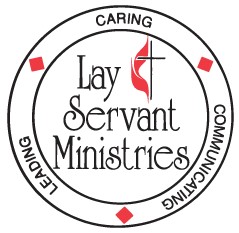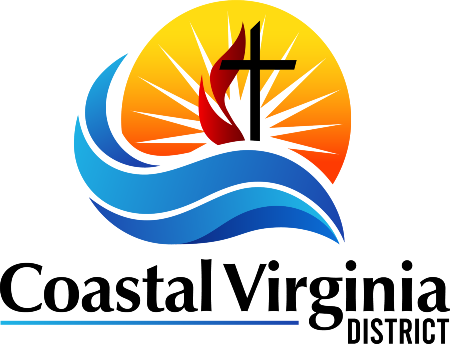Lay Servant Ministries of the Coastal Virginia District
Lay Servant Ministries is one of the most significant lay leadership development programs available within the United Methodist connection. Through this equipping and empowering system, laity can grow as disciples of Jesus Christ who then go and make other disciples. Lay Servant Ministries can be a significant component of any intentional discipleship system, particularly systems based on the core process or cycle of discipleship described in ¶122 of The Book of Discipline.

Laity Leading, Caring, and Communicating Disciples
God calls each of us to a life of servanthood as a disciple of Jesus Christ. The United Methodist Church depends on God’s called servants to carry out its mission and purpose. To help laity respond to their call, the Lay Servant Ministries program provides training, support and opportunities to serve in our local congregations and the greater church.
Laity are the primary agents of holy love incarnate in the world: “The witness of the laity, their Christ-like examples of everyday living as well as the sharing of their own faith experiences of the gospel, is the primary evangelistic ministry through which all people will come to know Christ and The United Methodist Church will fulfill its mission” (2016 Book of Discipline, ¶127, “The Ministry of the Laity,” p. 97). In this sense, lay discipleship is always leadership and leadership is always evangelism—because all who follow Jesus lead others to him. Laity are called to be disciples—and disciples lead others to Christ.
What “L” is Your Calling?

Certified Lay Servants serve in their local church in a variety of ministry areas and may serve beyond through the LSM program. To certify, a lay servant must complete the basic introductory course and one advanced course.
Certified Lay Speakers serve in their local church and beyond as a ‘preacher’ of the Word, in addition to the opportunities to serve their local church in comparable Lay Servant roles. The LSM program may coordinate short-term pulpit supply in district churches upon request from pastors or the District Superintendent. There is a specific equipping (training) path to certify as a Lay Speaker which begins with the certified lay servant requirements.
Certified Lay Ministers serve in their local church and beyond to enhance the quality of ministry and ability of small membership churches, larger ministry teams and community needs. There is a specific equipping (training) path to certify as a Lay Minister.
The District Superintendent may assign a CLM to serve in a specific area of district leadership which may include assigning a willing and prepared CLM to serve as a Lay Supply Pastor in a district church/charge. Lay Supply Pastors are supervised by the District Superintendent or their designated Elder. A CLM serving as a Lay Supply must certify as a Lay Speaker in addition to completing the CLM training.
Another opportunity for the CLM is to specialize in one of eight (8) ministry areas that require additional education/training from accredited programs. (UM Parish Nurse, Children’s Faith Formation, NPHLM Lay Missioner, Men’s Ministry Specialist, UMC Path 1 Lay Church Planter, Congregational Care Minister, Certified UM Church Administrator and Simple Account Leadership Structure Specialist (SAS Coach).
Local Church Lay Servants serve only in their local church in a variety of ministry areas without choosing to certify in the LSM program. They may complete the same training as a certified lay servant.
Lay Leaders function in their local church as the primary representative and role model of Christian discipleship and faith lived out in the church and daily life. The lay leader works with the pastor to fulfill the mission and vision of the congregation. The Lay Leader position is an elected position that does not require the lay person to be a certified lay servant however certification can better prepare the Lay Leader for their leadership role.
Church Leaders are the heart of church ministry, mission, and methodology. Church leaders are elected or appointed to serve from their strengths and gifts. All Leaders are welcome to participate in the LSM Program which can help the leader chose a training path.
Lifelong Learners are influencers serving to transform lives and moved to action in their church and community through service in a variety of ministry and mission areas. Equipping (training) through the Lay Servant Program or other UMC training opportunities enriches their giftedness, skills and talents.
To Certify or Not?

As United Methodists, we believe that each of us is indeed a minister called through our baptism to the work of mission or ministry in all areas of our lives. As disciples of Jesus Christ, we are called to be lifelong learners, encouraged to use our influence to transform lives, and moved to action in our communities through service.
Certified or not, the lay servanthood are active members of local churches or charges who are ready and willing to serve the Church through their giftedness as one who is well informed and committed to scriptures, and the doctrine, heritage, organization and life of the United Methodist Church.
All of us as laity – the whole people of God – are called to continue the work of Christ for the redemption of the world. In partnership with our clergy, the role of the laity is to be the church in the world today. Lifelong Learners, Local Church Lay Servants and elected Lay Leaders are key non-certified roles in the life and ministry of any congregation.
The certified lay servant, lay speaker and lay minister willingly receive specific training to develop additional skills and knowledge for witnessing to the Christian faith through spoken communication, church and community leadership, and care-giving ministries. They continue their equipping through additional training and experience during their gift-based ministry.
Because we are each called to ministry, the Lay Servant Ministry Program invites all ministers to participate in training and equipping opportunities.
Certified or not, we are all in service together! Clergy and laity.
Why Lay Servant Ministries?
Psalm 37:5 says, “Commit your way to the Lord; trust in him, and he will act.”
Each of us must trust that God is present with us, loves us, and has work for us to do in our ministry be it certified or non-certified servanthood. Lay Servant Ministries is one of the most significant lay leadership development programs available within the United Methodist connection focusing on leading, sharing, and communicating learning.
If your calling to ministry leads you to certify in the Lay Servant Ministries program, you have the option to certify as Lay Servant, Lay Speaker or Lay Minister. You choose your path based on your call.
If your calling is to serve in one of the non-certified lay servanthood roles, the good news is that the Lay Servant Ministries Program welcomes you to participate in any of the coursework or training opportunities provided by the District. There are also conference and online equipping opportunities.
If you believe your calling is outside the program or a call to licensing, candidacy, or ordering as a Deacon, talk to your pastor.
What does Lay Servant Ministries Accomplish?
Equipping World-Changing Disciples is our mission as United Methodists. The LSM is one way laity can ‘equip’ for their life of servanthood. Any of us can find a calling in one or more of the LSM focus ministry areas of leading, caring, and communication. According to the Lay Servant Ministries Basic Course, there are over 50,000 people engaged in lay servant ministries to answer their call to ministry which indicates it is one of the most significant lay leadership development programs available within the United Methodist connection.
Lay Servant Ministries Legislation
Lay servant ministries are all-encompassing ministries based on love and service. It began as an act of love; it began as an example; it began as a challenge; it lingers with us today. Mark 10:45 reminds us “For even the Son of man did not come to be served, but to serve, and to give his life as ransom for many.” We may not be able to ransom many, serve many. (Basic Course)
The General Conference of The United Methodist Church 2016 approved several legislative petitions addressing paragraphs 266-271 of the Book of Discipline, submitted by the Discipleship Ministries Board of Directors. The rationale for these legislative petitions was to bring about clarity, consistency and collaboration. The adopted legislation streamlines and simplifies the processes for people to become certified. The adopted legislation was effective January 1, 2017.
LSM Requirements – how to certify
Certified Lay Servant, Lay Speaker and Lay Minister categories have certification and renewal requirements.
Review the 2016 LSM Legislative Information Sheet for details. [insert the info sheet]
Equipping and Empowering (Training) the Servanthood

Lay Servant Ministries provides educational equipping opportunities to enhance the giftedness laity need to be more effective Christian leaders and world-changing disciples.
As a result of the pandemic the district Lay Servant Ministries Program embraced online learning primarily through the Zoom Classroom where the instructor and participants could still meet in a hybrid face-to-face space. As the post-pandemic era allows us to gather in-person, the district LSM will launch an In-Person equipping (training) schedule during the lectionary “Ordinary Time”, June – October.
Our district spans the coastline of Virginia, from the coastal North Carolina state line to the coastal Maryland state line. We serve United Methodist congregations in Accomack County, Northampton County in the Eastern Shore area and congregations in the independent cities of Virginia Beach, Norfolk, Chesapeake, Portsmouth and Suffolk. Our In-Person training will be conducted at strategic locations North to South as we offer this season the Basic Course, six (6) core courses and the two sacrament courses. (Spiritual Gifts, Preaching, Worship Leading/Planning, Heritage, Polity, and Prayer).
The schedule will be released in advance of the season. Zoom Courses will continue throughout the year offering a variety of the other advanced Lay Servant Courses detailed in the LSM catalog.
Be A Disciple: Online Christian Education
BeADisciple.com has provided quality online educational experiences with roots in Wesleyan theology since 2006. The offer online studies, workshops and courses on a variety of ministry, formation and leadership topics. All of our courses offer CEU credits. Our goal is to make rich learning experiences accessible to church leaders and laity, no matter their location or life situation. Most of the Advanced Lay Servant Ministries courses are available during a calendar year.
Pathways to Certification

Discipleship Ministries of the United Methodist Church publishes an annual Lay Servant Catalog describing all the approved lay servant ministries courses. Courses are open to all servants. For those who are pursuing a new path to certify, the first course is the Basic Course (Introduction to Ministry). Then a course further exploring spiritual gifts is the best next step, however any of the advanced courses are open as the next step.
Discipleship Ministries Lay Servant Ministries Catalog
All the courses are open and appropriate for servants who do not chose to certify.
Advanced Studies
The Lay Servant Ministries Program team can help any servant design a course of study from the catalog. As an example, a servant who desires to study as a ‘Worship Leader’ would complete an advanced studies track:
- Basic Course and Discovering Your Spiritual Gifts Course
Leading/Planning, How Liturgy Shapes Us, Leading Prayer, UM Heritage, Communion, Baptism
For more information or assistance in planning a study play, contact the LSM team.
Shared Accountability – the Pastor and Lay Servant
Virginia Annual Conference LSM Reports and Forms
From evaluations to checklists, find the forms and certificates you need for Lay Servant Ministries.
Servants who have completed the Basis Course and their first Advanced Course can request their Pastor and Church Leadership to recommend them for certification by completing an Annual Lay Servant Report, signed by the Pastor and submitted to the District Superintendent and Lay Servant Ministries Board for approval.
Renewing servants must have completed at least one additional advanced course within 3-years of the current Charge Conference to be approved upon submission of their annual report.
The District Lay Servant Board reviews all reports to ensure accuracy and renewal eligibility. Reports will be returned to the Pastor if the servant does not meet requirements. The Board will work with the lay servant and their pastor to plan for renewal.


